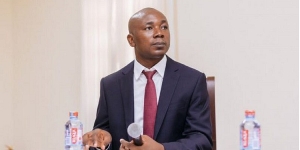Accra, August 1, GNA - Students of the External Degree Centre (EDC) of the University of Ghana, Legon, have said the University Authorities did not consult their representatives before they fixed the new fees.
A statement issued by the Interim Management Committee of the Students' Representative Council (SRC) said: "At no time were students consulted and their consent obtained for this policy as is being peddled by the University Authorities."
The statement denied that students at the EDC paid subsidized fees arguing that they paid the same fees as non-resident students of the University of Ghana although they had to cope with inadequate and sometimes deplorable facilities.
Fresh students, who have gained admission to study at the EDC, would from this academic year pay eight million cedis for Bachelor of Science (BSc) Administration and six million cedis for Bachelor of Arts (BA) Humanities.
The students were reacting to a statement by the Pro-Vice Chancellor of the University of Ghana, Professor Edward Ofori-Sarpong that they must pay realistic fees.
They said the average Ghanaian worker could not afford to pay the new fees, as he or she had to pay high utility tariffs, rent and other household expenses in addition to money spent on dependants.
The students said that the Centre grew out of the 1960 Commission on University Education, which recommended the organisation of courses leading to the award of degrees of the University of Ghana for persons, who intended to study for such degrees on part-time basis.
The basis of the establishment of the Centre as contained in the University's handbook is that part-time students at the EDC should not be disadvantaged vis-a-vis their full-time colleagues since both groups of students wrote the same examination.
The students argued that if this policy were to change then it must go through the right procedure.
The statement said as at now, there had been no official publication from the University on the fees and they had not been stated in the University's own schedule of fees published recently.
Students, who have been offered admission, have rather been asked to complete an undertaking accepting to be full fee paying students before they are told the amount to be paid.
The students said they were determined to use all legal means possible to stop the imposition of the policy.
Professor Ofori-Sarpong last week told the GNA that it had become necessary for managers of the nation's universities to charge realistic fees in order to give quality education.
He said nowhere in the world was a degree programme offered free of charge and, therefore, it was necessary to charge the right fees to be able to run enhanced programmes in the universities.
He said by a new policy approved by the Academic Board and the University Council, among other bodies, the External Degree Centre had become autonomous and was now known as the City University. The immediate needs of the new university, he said, included a computer laboratory, an upgraded library and offices.
Prof. Ofori-Sarpong said it was based on these and other factors that university was charging the new approved fees of eight million cedis and six million cedis for freshmen admitted to pursue BSc Administration and the humanities, respectively, beginning this year. Continuing students would not be affected.
General News of Friday, 1 August 2003
Source: GNA












